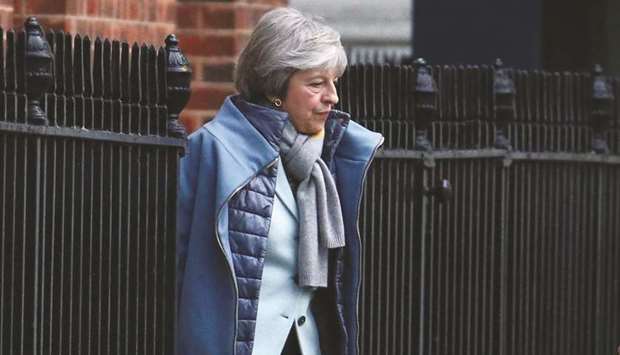The pound’s longest run of gains in a year faces a moment of truth today, when Theresa May is due to unveil her Plan B on Brexit.
Sterling just completed a fifth weekly gain versus the dollar, buoyed by speculation the prime minister will need to adopt a Brexit plan that keeps the UK closer to the European Union in order to win over parliament. Signs of a compromise may encourage more cautious investors to join the rally. But another standoff is likely to sour the mood and vindicate the decision by some traders to keep their powder dry.
“Given the hurdles in the next few weeks, cable has priced quite a lot of optimism,” said Vasileios Gkionakis, global head of currency strategy at Banque Lombard Odier & Cie SA. He expects Plan B to be “Plan A with some cosmetics around it,” and that may mean “some of that optimism will be priced out.”
The pound strengthened 0.4% last week to around $1.2900, taking its gains over the last five weeks to more than 2%. That marked the currency’s longest stretch of gains since January 2018, when it advanced for six straight weeks.
Sterling’s gains have come despite May’s divorce deal being roundly defeated in parliament. The currency has strengthened on hopes that a no-deal Brexit will eventually be avoided and a solution found to the deadlock. What that solution will be remains unclear, though a Bloomberg survey last week showed that strategists saw a 50% chance of Britain extending its March 29 deadline to leave the EU.
The rally in the pound has spurred declines in a gauge that measures anticipated swings in the currency. The implied volatility on sterling over a three-month period was around 11% on Friday, the lowest since November 13.
Gkionakis said that traders shouldn’t be lulled into complacency, with Britain heading into a prolonged period of uncertainty. UBS Global Wealth Management and Amundi SA, Europe’s largest money manager that oversees €1.4tn ($1.6tn), are also among those who remain cautious.
The political deadlock is opening up the possibility that Parliament will seize control of the process, with May so far refusing to budge on her key Brexit demands and cross-party talks faltering. After opposition leader Jeremy Corbyn’s first attempt at toppling the government with a no-confidence vote failed, there is also the risk he could try again, according to Canadian Imperial Bank of Commerce.

Britain’s Prime Minister Theresa May leaves Downing Street, London on Friday. Sterling has just completed a fifth weekly gain versus the dollar, buoyed by speculation the prime minister will need to adopt a Brexit plan that keeps the UK closer to the European Union in order to win over parliament.
